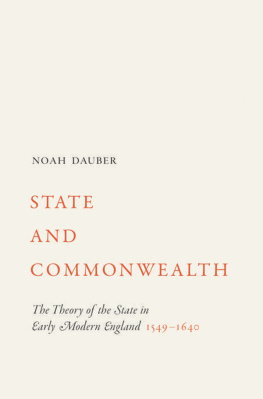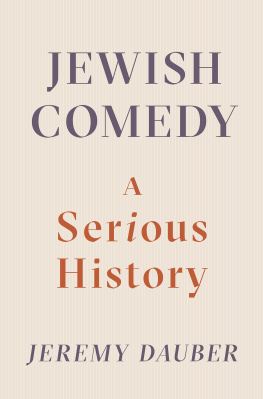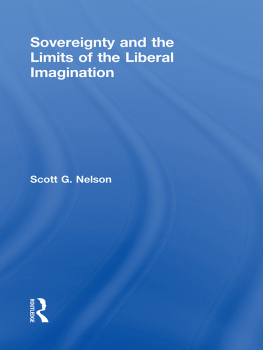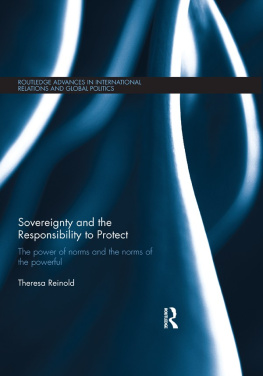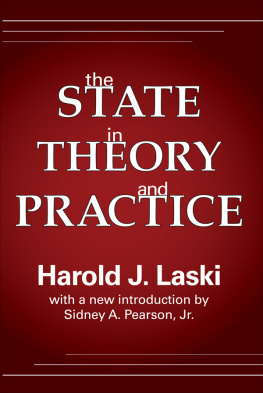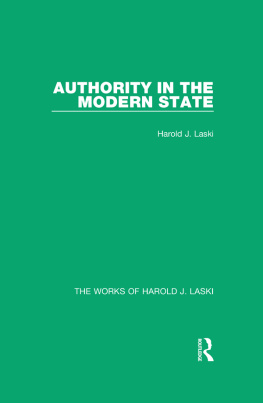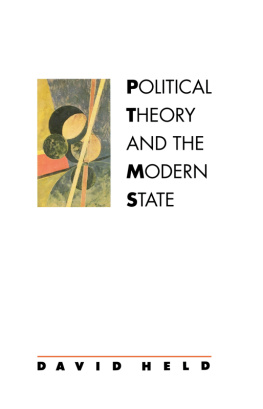
STATE AND COMMONWEALTH
STATE AND COMMONWEALTH
The Theory of the State in Early Modern England, 15491640
NOAH DAUBER
PRINCETON UNIVERSITY PRESS
PRINCETON AND OXFORD
Copyright 2016 by Princeton University Press
Published by Princeton University Press,
41 William Street, Princeton, New Jersey 08540
In the United Kingdom: Princeton University Press,
6 Oxford Street, Woodstock, Oxfordshire OX20 1TR
press.princeton.edu
All Rights Reserved
Library of Congress Cataloging-in-Publication Data
Names: Dauber, Noah, author.
Title: State and commonwealth : the theory of the state in early modern England, 15491640 / Noah Dauber.
Description: Princeton : Princeton University Press, 2016. | Includes bibliographical references and index.
Identifiers: LCCN 2016001828 | ISBN 9780691170305 (hardback)
Subjects: LCSH: Political scienceGreat BritainHistory16th century. | Political scienceGreat BritainHistory17th century. | Great BritainPolitics and government15581603. | Great BritainPolitics and government16031649. | State, The. | BISAC: POLITICAL SCIENCE / History & Theory. | POLITICAL SCIENCE / General.
Classification: LCC JA84.G7 D29 2016 | DDC 320.10942/09031dc23 LC record available at http://lccn.loc.gov/2016001828
British Library Cataloging-in-Publication Data is available
This book has been composed in Sabon Next LT Pro
Printed on acid-free paper.
Printed in the United States of America
10 9 8 7 6 5 4 3 2 1
TO MY PARENTS
CONTENTS
ACKNOWLEDGMENTS
M y first debt is to Richard Tuck. I have been studying the history of political thought and discussing it with him since the middle of my undergraduate years, and his example of formulating a position, thinking about it, and rethinking it over decades has made it possible and pleasurable to think of it as my lifes work. The earliest inklings of the approach taken in this book probably came from reading bits and pieces of Gierkes Natural Law and the Theory of Society and discussing them with him in those first years, and there are echoes of countless other conversations throughout this book. In graduate school, he introduced me to Istvan Hont, whose generosity and company I treasured then and for years afterward, and whose memory remains a constant reminder of the importance of serious scholarship in the history of political thought. When we first met, we discussed at some length the work of Horst Dreitzel, whose approach to the history of ideas has influenced mine ever since.
I owe my appreciation of the sophistication of the medieval Aristotelian commentary tradition to Christoph Fleler, Lidia Lanza, and Marco Toste, and I would like to acknowledge the Swiss National Science Foundation for its support of the time I spent working with those scholars at the University of Fribourg. Our work together is most obviously reflected in , but it has changed my understanding of the arc of the history of political thought more generally and has convinced me that there is still much more to say about the continuities between medieval and early modern political thought.
This book began to take definite shape during the semester I spent at Cambridge in the spring of 2014, and I thank my colleagues there for their wonderful generosity and hospitality. In particular, I am grateful to Annabel Brett, John Robertson, and Richard Serjeantson and the conveners and attendants of the wonderful Political Thought Work-in-Progress series, especially Hugo Drochon. Thankfully, Isaac Nakhimovsky and Karuna Mantena, longtime friends and colleagues, were in Cambridge at the same time, and they made hard work a pleasure. Another longtime friend, Leah Whittington, was a great help in the final stages of the book process; I cannot be more thankful for her friendship and for our ongoing dialogue.
At Colgate University, I have been blessed by wonderful colleagues. Many thanks especially to Melissa Kagle, Valerie Morkevicius, and Illan Nam for their friendship and intellectual companionship in general and particularly during the writing of this book. I also wish to thank my research assistants at Colgate, above all Ranissa Adityavarman, Lumbardh Halitjaha, and Skylar Salim. The support of the Colgate Research Council, which made research trips to England possible on a number of occasions, is much appreciated. Thanks are also due to the staff of the library at Chatsworth House, Derbyshire, and to Frank Reynolds of the Ulster University Library, who went above and beyond in helping me track the influence of Carlo Sigonio on William Harrison. Finally, I thank the anonymous readers for Princeton University Press for their thoughtful and detailed comments.
This book is dedicated to my parents, whom I cannot thank enough for their endless support. I would also like to thank my brothers, Jeremy and Andrew; my sisters-in-law, Miri and Sara; and above all my nieces and nephews for distraction and delight. They are a whole of which I am but a part.
ABBREVIATIONS
BL | British Library |
C | Code of Justinian |
Cowper | Thomas Starkey, England in the Reign of King Henry the Eighth. A Dialogue between Cardinal Pole and Thomas Lupset, Lecturer in Rhetoric at Oxford. Edited by J. Meadows Cowper and Sidney J. H. Herrtage. London: Published for the Early English Text Society by N. Trbner, 1871. |
CR | Philipp Melanchthon, Opera Quae Supersunt Omnia. Edited by Karl Gottlieb Bretschneider and Heinrich Ernst Bindseil. 28 vols. Halle: Schwetschke, 18341860 (= Corpus Reformatorum, vols. 128. |
D | Digest of Justinian |
Dialogue | Thomas Starkey, A Dialogue between Pole and Lupset. Edited by T. F. Mayer. London: Offices of the Royal Historical Society, University College London, 1989. |
EL | Thomas Hobbes, The Elements of Law, Natural and Politic. 2nd ed. Edited by Ferdinand Tnnies. New York: Barnes and Noble, 1969. |
LL | Francis Bacon, The Letters and the Life of Francis Bacon. Edited by James Spedding. 7 vols. London: Longman, 1861. |
Orations | Edward VIs 55 Latin orations, written under the instruction of John Cheke. BL Add. 4724. |
SC | John Case, Sphaera Civitatis. Oxford, 1588. |
Weinberger | Francis Bacon, The History of the Reign of King Henry the Seventh. Edited by Jerry Weinberger. Ithaca, NY: Cornell University Press, 1996. |
STATE AND COMMONWEALTH
INTRODUCTION: STATE, REPUBLIC, AND COMMONWEALTH
T he name that we most commonly use today for political organization, the state, is ambiguous, meaning either the nation or the administrative staff. The early modern predicament was far worse. The Latin terms civitas and respublica had many more meanings. John Case wrote in the Sphaera Civitatis, the most extensive work of political theory in Elizabethan England, that respublica, translated then and now as commonwealth, could mean four distinct things: the public use of goods, the multitude of citizens, the union of the multitude, or the order and organization of government.
If everyone had only agreed with Cases recommendations to use respublica for the state, civitas for society understood as a community, and multitudo
Next page
